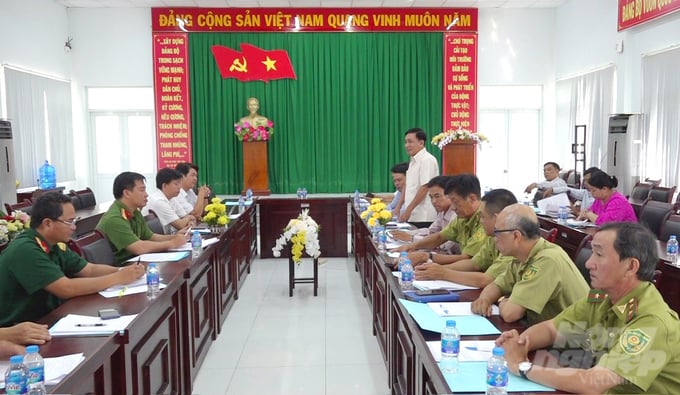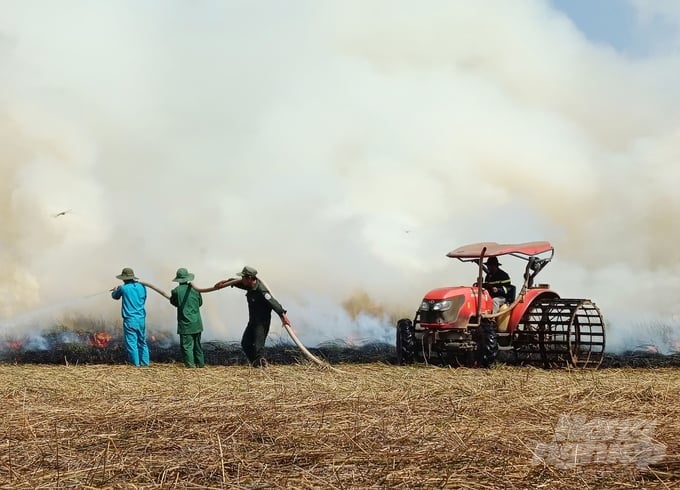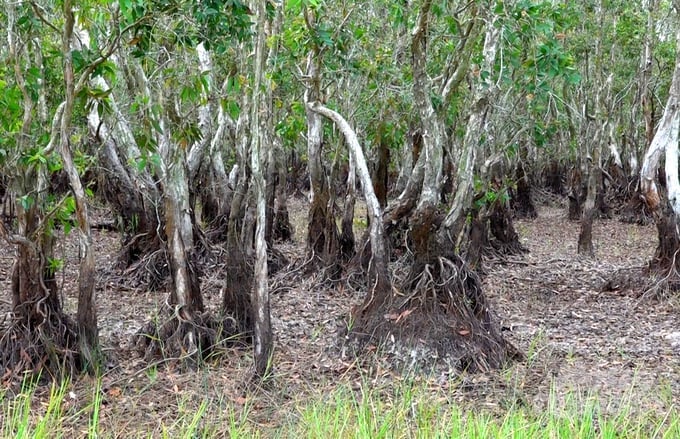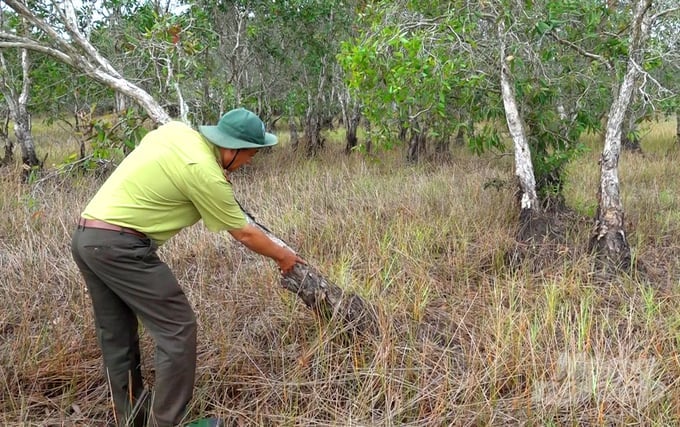June 15, 2025 | 19:27 GMT +7
June 15, 2025 | 19:27 GMT +7
Hotline: 0913.378.918
June 15, 2025 | 19:27 GMT +7
Hotline: 0913.378.918

The Tram Chim National Park Management Board and Tam Nong District People's Committee (Dong Thap province) held a meeting to review the forest fire that occurred in mid-June at Tram Chim National Park. Photo: Le Hoang Vu.
According to reports, Tram Chim National Park conducted two rounds of controlled grass burning: the first round covered 36 hectares of Eleocharis grass and vegetation; and the second round covered over 62 hectares in sector A5, which was previously home to significant amounts of Eleocharis, the primary food source for the saurus crane.
During the first half of 2024, Tram Chim National Park recorded seven fires in sectors A1, A2, A3, and A5; resulting in over 34 hectares of damage. The fire affected over 21 hectares of melaleuca forest, and over 13 hectares of grassland. Notably, the fire on June 11, 2024, resulted in more than 20 hectares of damage. Delegates at the meeting highlighted the challenge of extinguishing fires under the melaleuca canopy due to the large tree trunks, which resulted in the rekindling of two fires that were subsequently controlled and extinguished.
Following the fires, the park assigned personnel to monitor the affected area for one to two days to ensure safety. Regular directives for the forest protection force in patrolling, protecting, and monitoring fire lookout towers enable timely detection and extinguishment of fires, thereby minimizing damage. Additionally, the park focused on coordinating with relevant sectors and promptly remedying limitations in terms of fire prevention and control measures.

During the first half of 2024, Tram Chim National Park recorded seven fires across sectors A1, A2, A3, and A5; resulting in over 34 hectares of damage. Photo: Le Hoang Vu.
Notably, initial assessment of fire dynamics is crucial to the deployment of resources and prevention of unnecessary depletion during firefighting efforts. In the event of a fire, priority missions include monitoring wind direction and the layout of the melaleuca forest within the area; deploying advance teams to surround the fire; and promptly reporting to the firefighting command center. This response will facilitate the effective deployment of firefighting equipment on-site.
Due to the varied scale and nature of each fire incident, effective firefighting command requires a thorough understanding of the current situation; and readiness to respond to developments. This approach enhances the efficiency of firefighting operations, ensuring the safety of both personnel and property.
Delegates at the meeting noted that the affected areas, located near residential zones, housed a smaller local bird population. Moreover, water levels in the region have declined in recent months, forcing waterfowl to relocate in search of aquatic prey. Similarly, forest-dwelling birds, specializing in insect hunting, are also less prevalent in this area due to the high elevation and dense vegetation, which prevent bird flocks from effectively hunting for prey.

Melaleuca are fast-growing trees that can quickly regenerate even after being completely burned. These trees can regenerate naturally through seed dispersal and rapidly recover. Photo: Le Hoang Vu.
Nguyen Hoai Bao, Deputy Director of the Wetland Research Center (University of Natural Sciences under the Vietnam National University, Ho Chi Minh City), stated that the fires located under the melaleuca canopy and within dry grasslands, vegetation in Tram Chim National Park were promptly controlled and extinguished. Notably, the controlled fires facilitated the removal of old vegetation mats, thereby stimulating the germination of various plant species. Consequently, they promote the development of the ecosystem, regeneration of plant life, improvement of soil quality, control of pests and diseases, and elimination of fire-prone factors such as dead branches and dry leaves, thereby reducing the risk of large-scale fires.
Melaleuca are fast-growing trees that can quickly regenerate even after being completely burned. These trees can regenerate naturally through seed dispersal and rapidly recover.

The leadership of Tram Chim National Park has focused on inspecting fire prevention and control measures; and enhancing the responsibility, vigilance of the forest protection forces. Photo: Le Hoang Vu.
Nguyen Van Lam, General Director of Tram Chim National Park, stated that moving forward, the park will continue to maintain round-the-clock shifts at the command center, stations, fire lookout towers, and field camps; in order to promptly detect and organize firefighting forces, preventing the spread of fires. The park will also implement plans to coordinate the management, protection, and development of the forest between Tram Chim National Park and relevant agencies. Enhanced patrols and surveillance efforts will focus on critical areas to promptly prevent illegal activities such as wildlife trapping, aquatic resource exploitation, honey collection, and livestock grazing that can potentially contribute to fire incidents.
"Enhancing inspection of fire safety measures and raising the responsibility, vigilance of the forest protection forces are crucial. We will collaborate with local authorities to continue raising awareness among residents living within the park's vicinity regarding scientific and effective forest fire prevention and control," emphasized General Director Nguyen Van Lam.
Translated by Nguyen Hai Long

(VAN) The working delegation from the Ministry of Agriculture and Environment conducted an important trip to the Netherlands to strengthen strategic partnerships and sustainable development in the agricultural sector.

(VAN) The letter ‘A Plea from the Ocean’ not only evokes emotion but also awakens the human conscience to the responsibility of protecting life on Earth.

(VAN) The Department of Agriculture in South Africa has announced the country’s first mass vaccination of poultry to prevent local birds from contracting avian influenza.

(VAN) Establishment of the Mekong Delta Regional Agricultural Linkage Center, aiming for a closed value chain, deep processing, trading platforms, and international market connectivity.

(VAN) Gia Lai province has recently recorded 460 rare species of animals and plants, contributing to forest conservation and biodiversity planning in the region.

(VAN) Ms. Caroline Beresford, New Zealand Ambassador to Vietnam, expressed confidence that agricultural cooperation between Vietnam and New Zealand will develop sustainably, be climate-resilient, and promote gender equality.

(VAN) Vietnam reaffirms its commitment to international cooperation in fostering sustainable and responsible fisheries while ensuring resilient livelihoods for small-scale fishing communities.